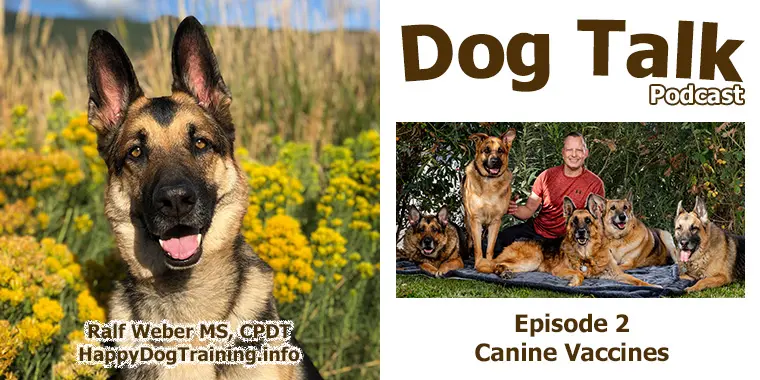
Podcast Episode 2: Canine Vaccines
As I am not a veterinarian, I am not permitted to give medical advice regarding canine health. I am not going to. I will share publicly available information from the latest studies on canine vaccines.
This is NOT an anti-vaccine podcast. This is about understanding the importance of canine vaccines and vaccinating responsibly. That often means less frequently.
Your dogs need to be vaccinated against things that can kill them. Legally, you are required to get a rabies vaccine every three years in most states. There are efforts underway to change the interval to five years (tests are in progress to prove seven-year immunity) by the Rabies Challenge Fund. Dr. Ronald Schultz and Dr. Jean Dodds, two highly respected vaccination experts, outline the current state of knowledge on established canine vaccine durations and immunizations on their website.
No other canine vaccine is mandated by law, but Parvo and Distemper are also considered core vaccines and should be administered. Some also consider Hepatitis a core canine vaccine, but Dr. Dodds disagrees, and she is the expert.
Understanding Canine Vaccines and Immunity
Based on studies, most canine vaccines last five years to your dog’s lifetime! Studies consistently show that most vaccines only need to be given once for lifetime protection. Luckily, more and more veterinarians (especially holistic veterinarians) can now perform affordable titer tests in-house. Titer tests show with absolute certainty if your dog has immunity (antibodies in the blood) or not and need a new vaccination (Journal of Veterinary Medicine, February 2002). Vaccines, like every medical procedure, have risks and there can always be adverse reactions (Canine Vaccine Adverse Events, Aguirre, 2007).
Personally, I don’t give my dogs any other vaccines aside from the core vaccines. The diseases addressed by all the other vaccines are either easily treatable, should they occur, or are rare, to begin with. If a veterinarian—especially the ones in veterinary hospital chains are known for this—recommends vaccines against diseases other than the core vaccines, it is always a good idea to spend a few minutes searching online how many cases of this disease were reported in the prior year in the country overall and in your state in particular. The fewer the cases, the lower the risk. Decide from there what is best for your dog.
Keep in mind that most boarding and grooming places require your dog to get a Bordetella vaccine (basically your dog’s flu shot), some every six months! That is pretty reckless. This is one of the reasons I groom my dogs myself and have a private, in-home pet sitter when necessary.
There is also coronavirus in dogs. The canine coronavirus is a respiratory infection like all coronaviruses. However, it has nothing to do with COVID-19. Canine coronavirus infections are rare, easily treatable and generally considered a low-risk disease.
Listen to the Experts
Dr. Ronald D. Schultz is the Professor and Chair of the Department of Patho-Biological Sciences at the School of Veterinary Medicine at the University of Wisconsin-Madison.
Dr. Jean Dodds, DVM, was a research scientist with the New York State Health Department and Executive Director of the New York State Council on Human Blood and Transfusion Services. She is also the founder of hemopet.org (thyroid blood tests) and nutriscan.org (saliva food allergy tests). I frequently listen to this vet’s advice.
In short, these two experts know what they are talking about.
Related Article: Dog Vaccinations
Links to the Canine Vaccine Studies:
- Duration of Immunity After Rabies Vaccination in Dogs – The Rabies Challenge Fund Research Study (PDF) by Dr. Jean W. Dodds and Ronald D. Schultz, 2020
- Duration of Immunity to Canine Vaccines (PDF) by Dr. Ronald D. Schultz, 1998
- Duration of Immunity for Canine and Feline Vaccines (PDF) by Dr. Ronald D. Schultz, 2015
- 2017 AAHA Canine Vaccination Guidelines (PDF) by Dr. Ronald D. Schultz, 2017
- 2018 Vaccine Protocol and Best Practices (PDF) by Jean Dodds, DVM
- Research: Changing Vaccine Protocols (PDF) by Jean Dodds, DVM
- Vaccine Adverse Events (PDF) by Aguirre et al, J Am Vet Med Assoc 231:79-88, 2007
Book: Stop the Shots

This is a great book for short-and-sweet overview on canine (and feline) vaccination. The author explains how dog’s immune systems work and what to know about vaccines, titer tests, and risks. I recommend this book to anyone who wants to know more and learn what is best for their pets.
I wrote extensively about the research, data, and studies on pet vaccinations in my articles Dog Vaccinations and My Vet Said ….
Play the Audio

Watch the Video
If you are ready to get help with your own dog(s), please use our dog training contact form to schedule a free phone consultation.

